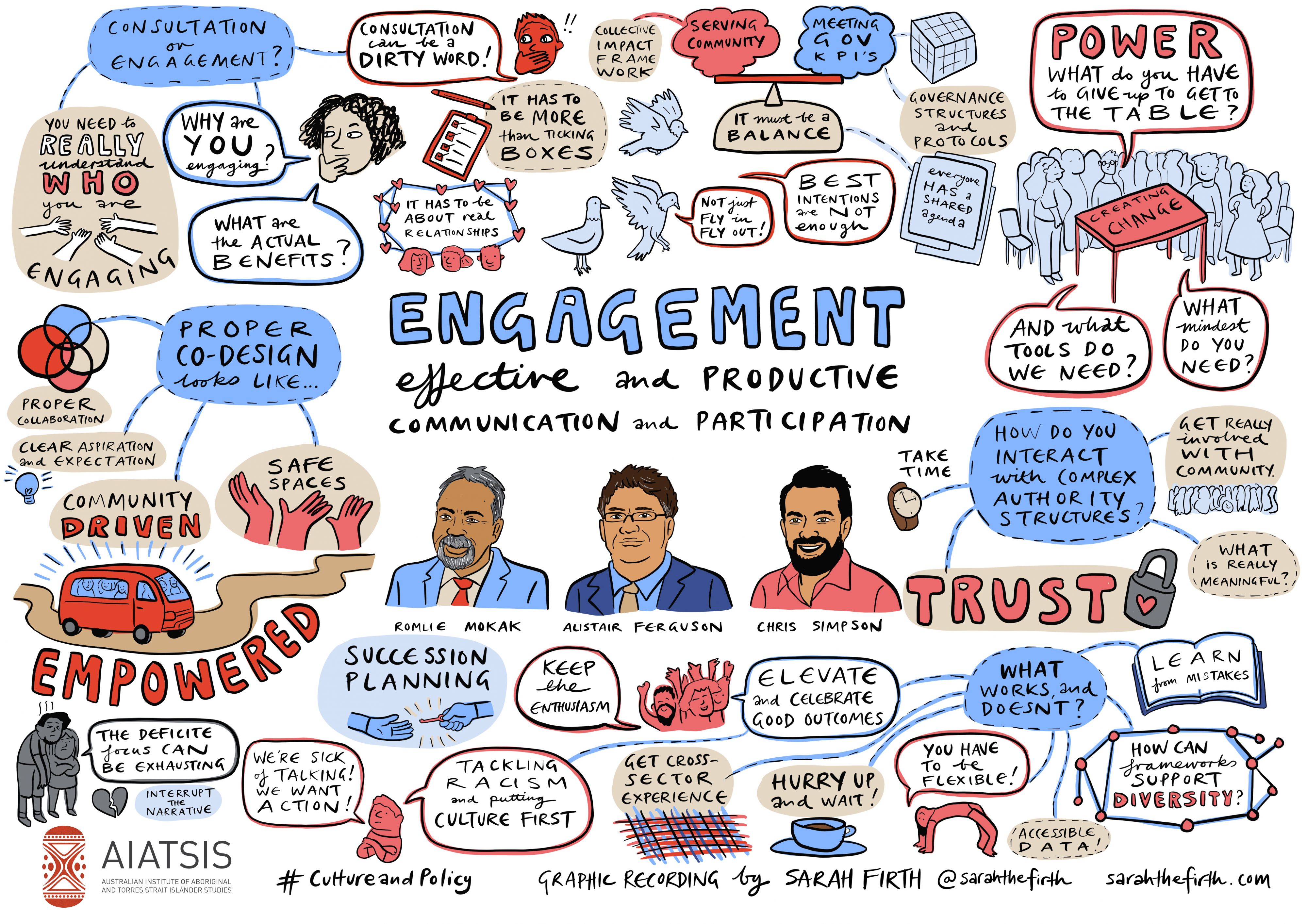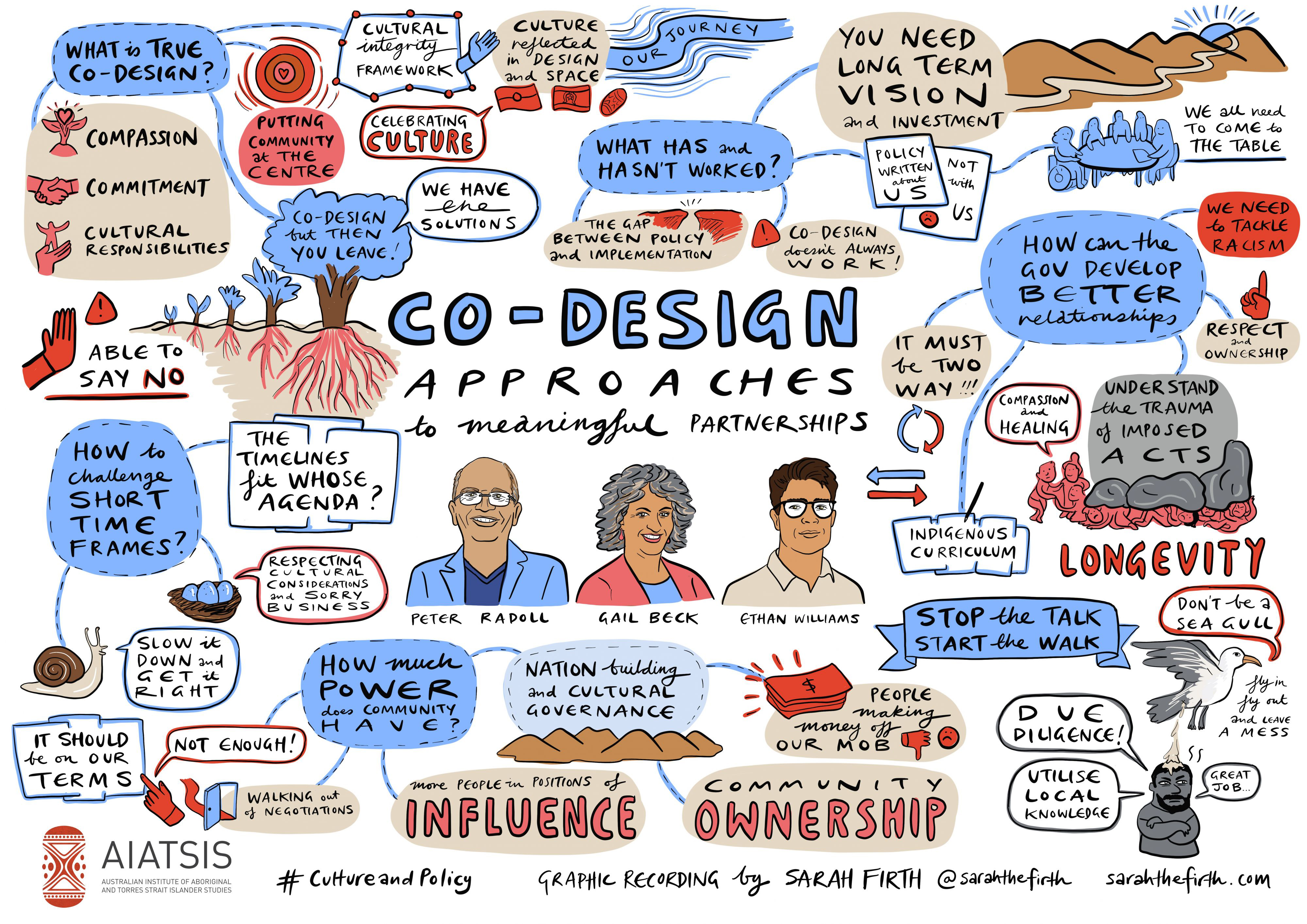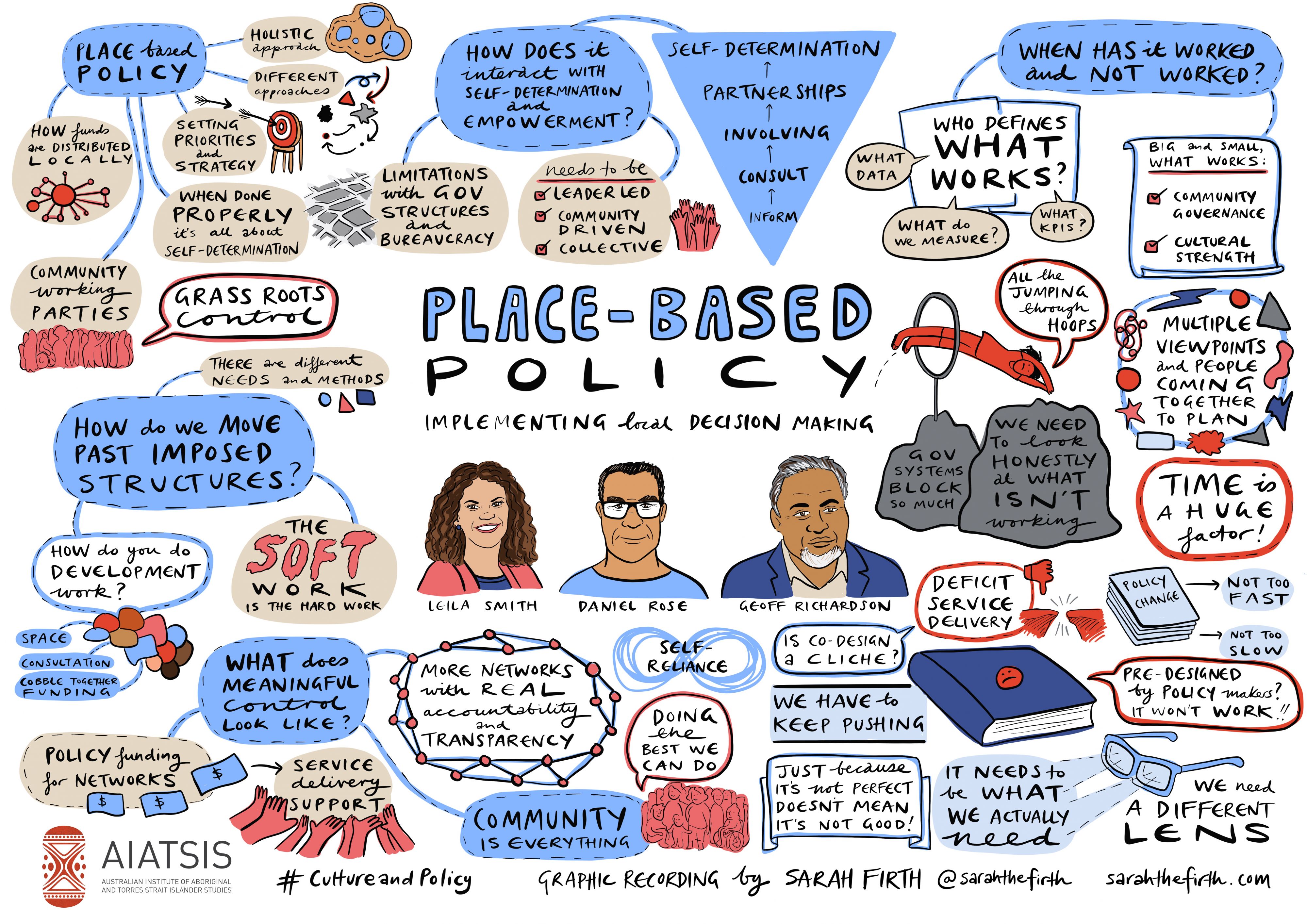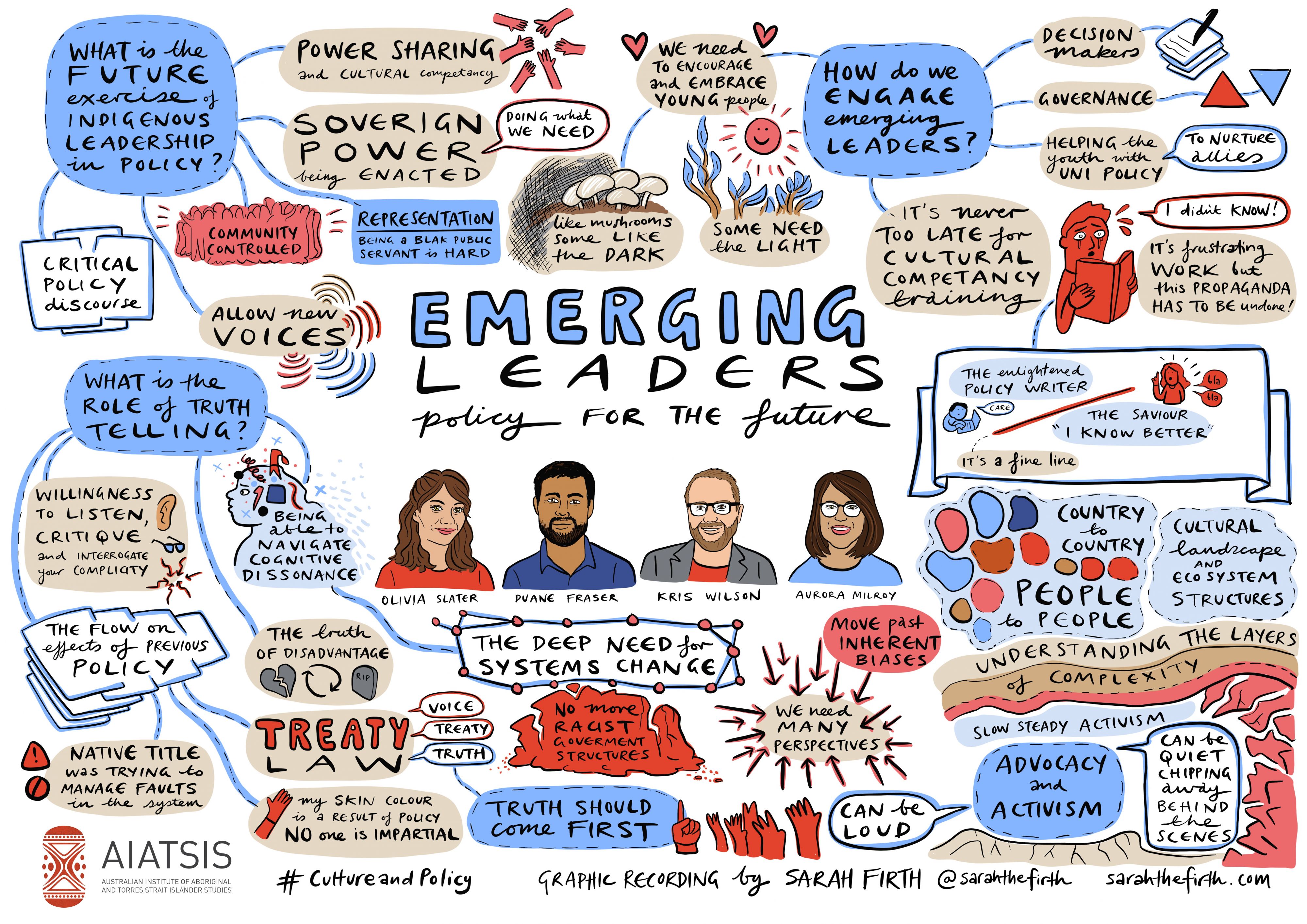AIATSIS hosted a second symposium on Indigenous culture and policy in February 2020.
In the Dhanggati language, nyiyanang wuunggalu means ‘let’s work together’. Our use of this phrase highlights that, although governments commonly reference ideas about ‘co-design’, ‘place-based’ policy, and working ‘with’ Indigenous peoples, these ideas are often not translated into practice.
Through this event, we explored what it means to develop policy and programs in partnership with Aboriginal and Torres Strait Islander peoples and communities. By bringing together community leaders, policymakers and researchers, we aim to shape contemporary policy and practice as well as identify the skills required and challenges to overcome.
This event has now concluded.
National Portrait Gallery, Canberra.
-
Keynote speakers - Day 1
Hoani Jeremy Lambert
Hoani Jeremy Lambert (Ngati Kahungunu ki Te Wairoa) is a career public servant and is currently the Deputy Chief Executive, Voices of Children at Oranga Tamariki - Ministry for Children.
In this role Hoani is responsible for advocating for children and young people’s interests across the government system, ensuring their voices are at the centre of government policy, service design and delivery. He is also responsible for overseeing his Ministry’s implementation of new legislative duties in relation to the Treaty of Waitangi.
As part of the current public service reforms in New Zealand, Hoani is leading a working group to develop a Māori cultural competency framework for senior public servants as part of the Leadership Success Profile (LSP).
Although a specialist in communications, public relations and social marketing, Hoani has had a diverse range of professional roles. He has worked in parliament, directed biosecurity border operations and, most recently, worked as a diplomat with the Ministry of Foreign Affairs and Trade.
Hoani holds an Executive Masters in Public Administration through the Australia and New Zealand School of Government (ANZSOG).
Colleen Hayward
Colleen Hayward is a senior Noongar woman with extensive family links throughout the south-west of WA. She comes from a teaching family with her father having been the first Aboriginal teacher, and Principal, in WA.
For more than 30 years, Colleen has provided significant input to policies and programs on a wide range of issues, reflecting the needs of minority groups at community, state and national levels. She has an extensive background in a range of areas including health, education, training, employment, housing, child protection and law & justice as well as significant experience in policy and management.
Among her many achievements, she has been recognised for her long-standing work for and on behalf of Aboriginal and Torres Strait Islander communities across Australia by winning the 2008 National NAIDOC Aboriginal Person of the Year Award. Colleen is also a recipient (2006) of the Premier of WA’s prestigious Multicultural Ambassador’s Award for advancing human rights and anti-racism in the community and is the 2009 inductee into the WA Department of Education’s Hall of Fame for Achievement in Aboriginal Education.
In 2011, she completed her term as a foundation member of the inaugural Board of the National Congress of Australia’s First Peoples. In 2012, Colleen was inducted into the Western Australian Women’s Hall of Fame and was recognised as a Member in the General Division of the Order of Australia.
In 2015, Colleen was a finalist in the Australian of the Year (Western Australia) Awards. 2015 also saw Colleen awarded one of Murdoch University’s Distinguished Alumni for her work in the areas of Equity and Social Justice. She was named as one of WA’s 100 most influential West Australians in both 2015 and 2016.
Until her recent retirement, Colleen was Edith Cowan University’s Pro-Vice-Chancellor, Equity and Indigenous as well as Head of Kurongkurl Katitjin, Centre for Indigenous Australian Education and Research. She remains strongly connected to and involved with Aboriginal issues especially Education.
Kevin Smith
Kevin Smith has traditional connections to Ugar (Stephen Island) and Erub (Darnley Island) in the Torres Strait. Kevin has over 28 years of professional experience in Indigenous affairs, including senior positions with the National Secretariat of Torres Strait Islander Organisations, the Brisbane Aboriginal and Torres Strait Islander Legal Service, the National Native Title Tribunal, Aboriginal Hostels Limited (AHL) and the National Native Title Council.
Kevin has been the Chief Executive Officer of Queensland South Native Title Services since 2008. Kevin holds qualifications in both law and business management from the University of Queensland. He was admitted as a solicitor in 1994.
Craig Ritchie
Craig Ritchie is an Aboriginal man of the Dhunghutti and Biripi nations and is the Chief Executive Officer at the Australian Institute of Aboriginal and Torres Strait Islander Studies (AIATSIS). Prior to coming to AIATSIS he was Branch Manager, International Mobility in the Australian Government Department of Education and Training. In this role he was the senior departmental executive responsible for the Australian Government’s Endeavour Awards, which support international student and researcher mobility, and policy leadership on qualifications recognition. He was the Departmental lead on the Australian Government’s education relationships in America, the Middle East and Africa, along with APEC and UNESCO.
Daryle Rigney
Daryle Rigney a citizen of the Ngarrindjeri Nation, is Professor and Director of the Indigenous Nations and Collaborative Futures Research hub in the Jumbunna Institute for Indigenous Education and Research, University of Technology Sydney. He is a board member of the Australian Indigenous Governance Institute, a member of the Indigenous Advisory Council, Native Nations Institute, University of Arizona, a member of the South Australian Certificate of Education’s Expert Aboriginal Steering Committee and a Senior Fellow, Atlantic Fellows for Social Equity, Melbourne & Atlantic Institute, Oxford University, UK. Daryle’s academic and community work currently focus on developments in Indigenous nation building and governance following colonisation. He has published widely and influentially on these topics.
Dr Josie Douglas
Dr Josie Douglas is the Executive Manager, Policy and Governance at the Central Land Council. Josie works with CLC’s Executive and Council on progressing their identified policy priorities. She had a key role in negotiating the NT Treaty Memorandum of Understanding and progressing the National Partnership Agreement (remote housing) with the NT and Commonwealth governments. Josie has worked in Aboriginal community-controlled organisations and has held senior research positions at CSIRO and Charles Darwin University. She is a Wardaman woman and has lived and worked on the lands of Arrernte people in Alice Springs for many years.
-
Panel Speakers - Day 2
Engagement – effective & productive communication and participation
- Romlie Mokak; Commissioner, Productivity Commission
- Alistair Ferguson; Executive Director, Maranguka
- Chris Simpson; Director, Return of Cultural Heritage Project
Co-design – approaches to meaningful partnerships
- Peter Radoll; Pro Vice-Chancellor, Aboriginal and Torres Strait Islander Leadership and Strategy at University of Canberra
- Gail Beck; Regional Development - Manager, South West Aboriginal Land and Sea Council
- Ethan Williams; Coordinator, Cultural Connections Initiative at National Museum of Australia
Place-based policy – implementing local decision-making
- Leila Smith; Deputy CEO, Aurora Education Foundation
- Daniel Rose; CEO, Murdi Paaki Services Limited
- Geoff Richardson; Executive, First Nations Development Services
Emerging Leaders – policy for the future
- Olivia Slater; PhD scholar, University of Cambridge
- Duane Fraser; Community Engagement and Indigenous Project Specialist
- Kristopher Wilson; Lecturer, Faculty of Law University of Technology Sydney
- Lecturer, University of Western Australia Law School
Panel Facilitator - Day 2
Graphic Recorder - Day 2
Summary
Let’s work together – but on Indigenous terms
The message emerging from Nyiyanang wuunggalu! was clear: Aboriginal and Torres Strait Islander peoples and communities are making their own policy, and if government wants to work ‘with’, rather than ‘to’ or ‘for’, them, then real structural reform is needed.
Day 1
Day 1 of the Symposium opened with a powerful Welcome to Country by Ngunnawal Elder and AIATSIS Chief of Staff, Jude Barlow, who reminded delegates of the very real impacts of government policies on Aboriginal and Torres Strait Islander peoples.
AIATSIS CEO Craig Ritchie’s opening keynote then set the scene of the dominant ‘Aboriginal policy paradigm’ that has and continues to constrain government policymaking, arguing that ideas such as Indigenous incapacity need to be replaced by a real appreciation and understanding of Indigenous assets, such as resilience and innovation. Professor Colleen Hayward echoed this sentiment in her urgent callthat what was once enough, is no longer – we need to move beyond simply having more Aboriginal and Torres Strait Islander people in leadership positions and we need to start thinking about how frameworks of leadership can be structured around Indigenous ways of doing and thinking. Place-based policy is not sufficient; ‘face-based’ work is needed.
What followed was a series of insightful keynotes that highlighted different angles from which to see the challenges of Australia’s current policy frameworks. Hoani Jeremy Lambert highlighted how Maori styles of leadership are being put at the forefront of changes to the Aotearoa/New Zealand public service. Kevin Smith suggested that we need to rethink policy as operating in a ‘quad-partite’ structure – adding Indigenous peoples’ governance and the Indigenous Estate, on top of the existing three layers of Commonwealth, state and local government. Dr Josie Douglas outlined the policy perspective from central Australia, where she works, demonstrating the large gap between public servants in Canberra and those working in communities ‘on the ground’. Finally, Professor Daryle Rigney outlined the nation building activities of the Ngarrindjeri people, adding to Dr Douglas’ picture of policy work outside of the Canberra bubble.
Day 2
Day 2 saw a series of panels that elaborated upon many of the themes raised in Day 1, guided skilfully and entertainingly by MC, Shelley Ware. Although intended to provide the ‘practical’ aspect of the ‘theory’ outlined in Day 1, it soon became evident that such a separation is unhelpful. There are no hot ‘policy tips’ that can simply be slotted into government business as usual; the whole business of government needs to be re-thought to allow for real structural change.
Christopher Simpson, speaking about his ‘engagement’ work, gave the advice that policymakers need to ‘hurry up and wait’; to carry out proper engagement and ‘co-design’ requires that governments recognise that their timelines often do not align with those of communities they wish to work with. Gail Beck noted in a similar vein that governments need to be working towards their own removal: true co-design should end in programs where government is no longer a part of implementation, and Geoff Richardson echoed
this point in highlighting how place-based policy should ultimately be about Aboriginal and Torres Strait Islander self-determination.
Day 2 finished with a highly engaging panel from a group of emerging Indigenous leaders who echoed the themes of the past two days. Dr Kris Wilson reiterated the clear link between historical policy and the present, sparking a discussion about the role of truth telling, and how truth (and treaty) offers a way to fix the fundamental contradictions in the legal foundation of Australia. The panel ended with a recognition of the important policy work that Aboriginal and Torres Strait Islander people do – not only within the constraints of the public service, but outside, in community led and controlled organisations too.
Nyiyannag wuungalu! concluded with the ball in the court of policymakers. Many Aboriginal and Torres Strait Islander individuals and communities are already heavily engaged in the process of making policy, inside and outside government. How will you build on their work – as friends, colleagues or allies – to create a better policy future that is truly led by Aboriginal and Torres Strait Islander people and peoples?
Contact
For more information, please contact the Indigenous Culture and Policy team via email, icp@aiatsis.gov.au.



